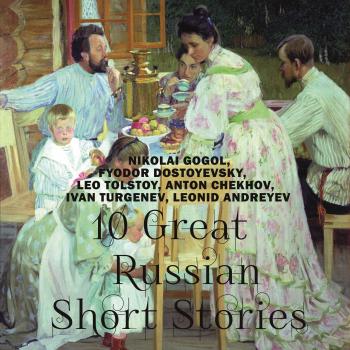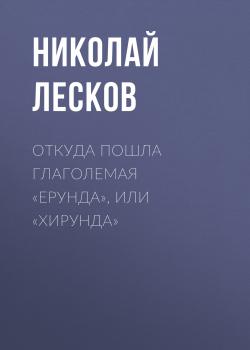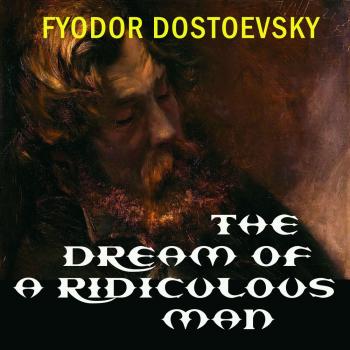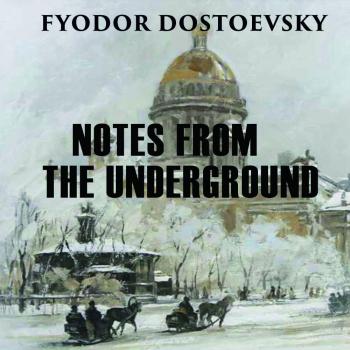ТОП просматриваемых книг сайта:
Русская классика
Различные книги в жанре Русская классика, доступные для чтения и скачиванияАннотация
Статья является откликом на оживленную газетно-журнальную полемику, возникшую вокруг появившегося в апреле 1886 года двенадцатого тома Сочинений гр. Л. Толстого. Сам Лесков принял в полемике непосредственное участие. В своей статье писатель разбирает этическое учение Толстого, его народолюбие, показывая, насколько обращение Толстого к «мужику» органичнее и серьезнее, нежели раздраженные рекомендации Достоевского «учиться всему» у «куфельного мужика».
Аннотация
«Мой собеседник – офицер, он участвовал в последней кампании, дважды ранен – в шею, навылет, и в ногу. Широкое, курносое лицо, светлая борода и ощипанные усы; он не привык к штатскому платью – постоянно оглядывает его, кривя губы, и трогает дрожащими пальцами чёрный галстук с какой-то слишком блестящей булавкой. Подозрительно покашливает, мускулы шеи сведены, большая голова наклонена направо, словно он напряжённо прислушивается к чему-то, в его глазах, отуманенных усталостью, светится беспокойная искра, губы вздрагивают, сиповатый голос тревожен, нескладная речь нервна, и правая рука всё время неугомонно двигается в воздухе…»
Аннотация
10 Great Russian Short Story. The Russian short stories that will make a vivid impression on a person: The Mantle by Nikolai Gogol, Notes from the Underground by Fyodor Dostoevsky, The Dream of a Ridiculous Man by Fyodor Dostoyevsky, The Death of Ivan Illyich by Leo Tolstoy, Darkness by Anton Chekhov, The Avenger by Anton Chekhov, A Troublesome Visitor by Anton Chekhov, Mumu by Ivan Turgenev, First love by Ivan Turgenev, The Little Angel by Leonid Andreyev.
Аннотация
«Я жил в то время в ниццкой гостинице, которую содержала добродушная полька. У нее был сын, семнадцатилетний, милый и ласковый, как веселый щенок, Петя, который мог свободно перепрыгивать через сервированный стол или из окна залы на террасу, чем приводил в восхищение сезонных дам, которые ему неоднократно дарили кольца с брильянтами, весом приблизительно около трех каратов. Надо сказать, что это был целомудренный мальчик, веселый товарищ, баловень всего дома и очень ловкий и сильный человек…»
Аннотация
«– Васька, и нет у тебя стыда ни капли… Погляди-ка ты на себя-то, на рожу-то на свою… Ох, погибель ты моя, Васька, не глядели бы на тебя мои глазыньки!.. – Мамынька… – Какая я тебе мамынька?.. Другим матерям дети-то на радость, а мне петля на шею. По станице идешь, так все пальцами тычут: вон Васькина мать идет. Приятно это матери-то, когда проходу нет от твоих качеств?..»
Информация о книге
Автор произведения Дмитрий Мамин-Сибиряк
Жанр Русская классика
Серия Сибирские рассказы
Аннотация
«Когда в доме накопится много старого, ненужного мусора, то хозяева хорошо поступают, выбрасывая его вон: от него в комнатах тесно, грязно и некрасиво. Но есть люди невежественные или невнимательные, которые вместе с отслужившим ветхим хламом не щадят и милых старинных вещей, обращаются с ними грубо и небрежно, бессмысленно портят и ломают их, а искалечив, расстаются с ними равнодушно, без малейшего сожаления…»
Аннотация
«…Я решаюсь думать, что есть люди, которым будет любопытно, а может быть, и полезно, узнать нечто, пролить истинный свет на происхождение слова „ерунда“, – слова, которое не только современно тургеневской реставрации слова „нигилист“, но которое и само по себе почитается у нас за признак „нигилистической одержимости“…»
Аннотация
"The Dream of a Ridiculous Man" (Russian: Сон смешного человека, Son smeshnovo cheloveka) is a short story by Fyodor Dostoyevsky written in 1877. It chronicles the experiences of a man who decides that there is nothing of any value in the world. Slipping into nihilism with the “terrible anguish” he is determined to commit suicide. A chance encounter with a young girl, however, begins the man on a journey that re-instills a love for his fellow man. It was first published in A Writer's Diary. The story opens with the narrator wandering the streets of St. Petersburg. He contemplates how he has always been a ridiculous person, and also, how recently, he has come to the realization that nothing much matters to him any more. It is this revelation that leads him to the idea of suicide. The narrator of the story reveals that he had bought a revolver months previous with the intent of shooting himself in the head. Despite a dismal night, the narrator looks up to the sky and views a solitary star. Shortly after seeing the star, a little girl comes running towards him. The narrator surmises that something is wrong with the girl's mother. He shakes the girl away and continues on to his apartment… Among the most significant works Fyodor Dostoyevsky - Poor Folk, The Double, The Landlady, Netochka Nezvanova, Uncle's Dream, The Village of Stepanchikovo, Humiliated and Insulted, The House of the Dead, Notes from Underground, Crime and Punishment, The Gambler, The Idiot, The Eternal Husband, Demons, The Adolescent, The Brothers Karamazov
Аннотация
The Christmas Tree and the Wedding" is a short story written by Russian author Fyodor Dostoyevsky published in 1848. The piece is narrated by an awkward outcast attending a Christmas party. He observes the party's guest of honour and takes special interest in one of the children. The narrator begins by mentioning to the reader that he had just been to a wedding but recalls a Christmas party that he had found more interesting. The party was given with the pretext of being a children's party, but its real purpose was for the wealthy host's family to talk business with rich members of the community. The wealthiest guest was Julian Mastakovich, a rotund landowner. Without anyone to talk to, the narrator fell to simply observing the guests. The narrator takes particular interest in the children. They were given gifts in accordance with their social standing. The eleven-year-old daughter of a wealthy government contractor received an expensive doll, while the poorest child, the son of the family governess, received only a small book without illustrations or even a front and back cover. After being bullied by the other richer boys, the poor boy retreats to another room where he and the rich daughter play happily with the doll. Julian Matsakovich also retreats from the rest of the crowd to observe the rich daughter, who already had a dowry set aside of 300,000 rubles. As Mastakovich observes the girl, he calculates what her dowry (with interest) would be at age sixteen, and he comes up with the astounding sum of 500,000 rubles. Mastakovich approaches the girl and kisses her on the head. The girl recoils from his gesture, and she looks to her playmate for protection. Mastakovich tries to scare the poor boy away while trying to get a promise of love from the young girl, and eventually he causes a scene where he chases the poor boy around the party, whipping at him with his handkerchief. The wedding that the narrator came across five years later was indeed the wedding between Julian Mastakovich and the rich girl, now sixteen. Famous works of the author Fyodor Dostoyevsky: Poor Folk, The Double, The Landlady, Netochka Nezvanova, Uncle's Dream, The Village of Stepanchikovo, Humiliated and Insulted, The House of the Dead, Notes from Underground, Crime and Punishment, The Gambler, The Idiot, The Eternal Husband, Demons, The Adolescent, The Brothers Karamazov.
Аннотация
Notes from Underground also translated as Notes from the Underground or Letters from the Underworld, is an 1864 novella by Fyodor Dostoevsky. Notes is considered by many to be one of the first existentialist novels. It presents itself as an excerpt from the rambling memoirs of a bitter, isolated, unnamed narrator (generally referred to by critics as the Underground Man), who is a retired civil servant living in St. Petersburg. The first part of the story is told in monologue form, or the underground man's diary, and attacks emerging Western philosophy, especially Nikolay Chernyshevsky's What Is to Be Done? The second part of the book is called «Apropos of the Wet Snow» and describes certain events that appear to be destroying and sometimes renewing the underground man, who acts as a first person, unreliable narrator and anti-hero. Fyodor Dostoevsky is also famous for such works as: Poor Folk, The Double, The Landlady, Netochka Nezvanova, Uncle's Dream, The Village of Stepanchikovo, Humiliated and Insulted, The House of the Dead, Notes from Underground, Crime and Punishment, The Gambler, The Idiot, The Eternal Husband, Demons, The Adolescent, The Brothers Karamazov.










